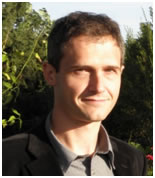 |
||
Home > TERATEC FORUM > Workshop 4
Workshop 4 - Wednesday, June 29 from 9:00 to 12:30
Specialised computing architectures : helpers or challengers ?
Novel brain-inspired computing machine: photonic harware demonstrating the Reservoir Computing concept
Abstract : The concept of artificial neural network (ANN) appeared roughly at the time when Turing von Neumann machines started to be implemented physically. Since then, despite important theoretical progress and repeated sequences of extreme enthusiasm followed by severe depression, the relevance of ANN and their breakthrough potential for a novel kind of powerful computing machines have been mainly explored and supported by numerical simulations of their conceptual models, through the use of... conventional Turing von Neumann machines they were aimed to replace. In the early 2000 however, a novel approach derived from ANN and known as Echo State Network, Liquid State Machine, and also Reservoir Computing (RC), was proposed to simplify one of the most critical issue in conventional ANN, the complexity and difficulty of an efficient learning step. Beyond encouraging performances in terms of computational power and efficiency, with comparable or sometimes even surpassing results compared to conventional ANN approaches, RC also allowed recently to consider physical implementations of the concept, opening the way to new hardware plateforms for computing machines. Moreover with physical implementation involving photonic architectures, the approach could also offer highly attractive features with unprecedented computational speed attached to the natural bandwidth of the involved fiber optics telecommunication devices.
After a brief introduction of the RC concept, we will propose a particular dynamical system viewpoint from which an unusual physical implementation has been proposed in order to emulate a virtual recurrent neural network through a non linear delay oscillator loop. This unconventional approach making use of delay dynamics, was actually a crucial trick at the origine of the first photonic RC demonstrator, with which speech recognition and chaotic time series prediction tasks have been successfully tested, not only with numerical simulation, but also with real physical hardware. We will conclude the talk with work under progress concerning the use of RC concept to solve real world problems: diagnostic and prognostic of a promising clean electrical energy generator (fuel cells), and beam control/stabilization of a complex and high dimensional femtosecond laser system dedicated to ultra-fast and ultra-precise machining tool for micro-nano-technologies.
 |
Bio : Laurent LARGER a obtenu un doctorat d'Optique & Photonique de l'université de Franche-Comté en 1997 ("Cryptographie par chaos en longueur d'onde"). Après une démonstration de laboratoire de communication optique cryptée par une porteuse chaotique, il explore essentiellement en optique les propriétés fondamentales du chaos dans les dynamiques non linéaires à retard, leurs possibilités de synchronisation, et aboutit en 2004 à la première démonstration sur un réseau commercial à fibre optique de cette nouvelle approche de sécurisation de données optiques sur la couche physique des réseaux fibrés (résultats publiés dans Nature). Il a également étudié les solutions périodiques des dynamiques à retard, en explorant sur le plan fondamental certaines de leurs propriétés de stabilité, et en développant expérimentalement leur potentiel en photonique pour la génération de micro-ondes à très grande pureté spectrale pour des applications radar. Plus récemment, il s'est intéressé aux transitoires non linéaires de ces dynamiques particulières dans une configuration intégro-différentielle, et à leur analogie avec des réseaux d'oscillateurs couplés. Ces travaux lui permettent d'aboutir en 2012 à la première démonstration expérimentale de l'implémentation optique du nouveau concept de calcul bio-inspiré connu sous le nom de "Reservoir Computing", ainsi qu'en 2013 à la découverte d'états chimères dans ces mêmes dynamiques à retard. D'abord Maître de Conférences à l'université de Franche-Comté, il prend la direction de GTL-CNRS Telecom à Metz, un laboratoire franco-américain entre le CNRS et GeorgiaTech Atlanta. Il devient ensuite professeur à l'université de Franche-Comté, et membre Junior de l'Institut universitaire de France. Depuis 2012 il est directeur adjoint de l'institut FEMTO-ST, un des plus grands laboratoires CNRS dans le domaine des Sciences pour l'Ingénieur (750 personnes). |
Register now and get your badge here
- TERATEC Forum is strictly reserved for professionals.
- Participation to exhibition, conferences and workshops is free (subject to seats available)
- On line registration is obligatory to attend exhibition, conferences or the workshops.
- The Vigipirate security plan being raised to its highest level, it is mandatory to register online in advance and come with an identity card order to participate in TERATEC Forum.
- The badge is free of charge and give you access to all events TERATEC Forum.
For any other information regarding the workshops, please contact :
Jean-Pascal JEGU
Tel : +33 (0)9 70 65 02 10
jean-pascal.jegu@teratec.fr
Campus TERATEC
2, rue de la Piquetterie
91680 BRUYERES-LE-CHATEL
France